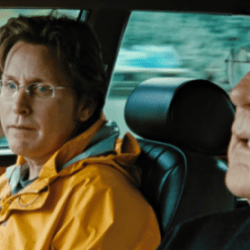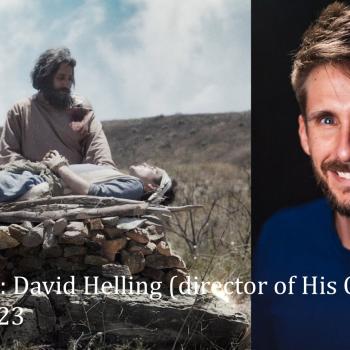
My interview with Ben Stein, the star and co-writer of Expelled: No Intelligence Allowed, is now up at CT Movies. I may post a longer version here in a few days. My interview with Expelled co-writer Kevin Miller has also been up at In The World, a sister publication to BC Christian News, for the past month or two or three.
APR 18 UPDATE: Here it is, the full unexpurgated interview!
– – –
By Peter T. Chattaway
“Darwin? Darwin?” Ben Stein never asks that question in his newest movie, Expelled: No Intelligence Allowed, but he could have.
Stein got his start as a lawyer and a speechwriter for Presidents Nixon and Ford, and in more recent years he has written books, offered investment advice, and hosted both a game show (Win Ben Stein’s Money) and a reality TV show (America’s Most Smartest Model) — but he is probably still best-known for playing the boring high-school economics teacher who took attendance in Ferris Bueller’s Day Off.
Now Stein is tackling education of a different kind, as the star of a documentary about the Intelligent Design movement — and the academic establishment’s efforts to stifle the debate over the limitations of evolutionary theory that many ID advocates have been calling for. The film comes out in April, but Stein spoke to CT Movies by phone in November, when the film was still in the rough-cut stage.
Doing this kind of publicity for a film before it’s finished — is that common in your experience?
Ben Stein: I don’t know if it’s common or uncommon. I have never been the star of a movie before, so this is a first for me. I’m not an expert in this area. I’ve been in a great, great many movies, but I’ve never been the star of a movie before.
How did you get involved in this particular movie?
Stein: Walt Ruloff [co-writer and co-producer of the film through Premise Media] called me and asked me if I would talk to him when I was up in Seattle doing a speech, and he showed me a whole bunch of very interesting slides and moving pictures about the cell, and we talked a lot about the historical effects of Darwinism and Social Darwinism, and he asked me if I would like to host a discussion about where Darwinism had gaps and where there were some unanswered questions about evolution and where organic life came from, and he said he would be eager to have me involved, and I could have a teeny little bit of input into the storyline, so to speak, and I told him I was especially horrified by what Darwinism’s social and historical impact had been on Jews, and that that would motivate me to try to get some involvement in the project. And so that was pretty much how I got going.
Do you know why Walt approached you for this?
Stein: I think he wanted a conservative in Hollywood, and there was a small list. A “short list,” I guess you might say.
How far along was the film when you got involved?
Stein: I don’t think any of it had been done, because we had meeting after meeting to discuss it. I was meeting with Walt and also with another fellow, Steve Meyer, a very smart fellow. We discussed it many, many times.
Do you conduct the interviews yourself?
Stein: I conduct some of them, but there are an awful lot that I don’t conduct. There’s another fellow named Mark Mathis, a very nice fellow, he does a lot of them too.
How long was the film in development before you began shooting anything?
Stein: Probably six, eight months. Yeah, we were talking about it a long time.
How familiar were you with the subject of Intelligent Design prior to this?
Stein: Not at all. I’m still not that familiar with it. I’m more familiar with it than most people, but nowhere near as familiar with it as a genuine expert in the subject would be. I don’t pretend to be a scientist, I’m no scientist, I don’t pretend to be, I’m sort of the person who moderates the discussion between and among the scientists.
What were those six to eight months like, in terms of becoming exposed to the subject?
Stein: Well for me, they were pretty much like any other six to eight months, because these meetings would only happen occasionally, and we’d sit around a big table and talk, and I’ve been in many meetings where we’ve sat around big tables and talked.
Were you doing a lot of reading?
Stein: Well I had some books. They sent me some books, some of which I read, some of which I did not read, and one of which I read cover to cover — From Darwin to Hitler — and that was a very, very interesting book, although I thought frankly it could have been even longer. It was one of these rare books I wish had been even longer.
Why did that book stand out for you?
Stein: Because it’s such an interesting subject. It’s about how Darwin’s theory — supposedly concocted by this mild-mannered saintly man with the flowing white beard like Santa Claus — led to the murder of millions of innocent people, maybe tens of millions.
Inevitably, this subject gets into the overlap between science and religion, and I’m curious as to what your own perspective is on this, or where you’re coming from. Do you have any sort of religious inclination yourself?
Stein: Well, I’m Jewish, and I believe in God, and I have always believed that there is a God who was the prime mover in the universe, so that it’s not hard for me to think of him as the Intelligent Designer.
And has your research into Intelligent Design and the debate around that affected your beliefs at all?
Stein: Yes, it has made my belief in that much stronger. It has pointed out something which haunted me as soon as I ever learned about Darwinism, which is where did it all start? How did life start? Okay, suppose we have some good idea about how it evolved. How did it start? And Darwinism has nothing to say about that — nothing useful, anyway — but I think Intelligent Design has a great deal to say about it.
I’ve only done limited reading on the subject myself, but just yesterday, I read an interview with [ID advocate] Phillip Johnson, who said that, as a scientific theory, Intelligent Design doesn’t necessarily lead to God, it could lead to an alien, or something like that.
Stein: I know, and that part has always struck me as– That’s not part of my view of it, let’s put it that way. Because then where did those people come from? If there are people from another planet, where did they come from?
Right. My understanding is that Intelligent Design advocates have tried to remain officially agnostic on that sort of question —
Stein: Well, they can be as officially agnostic as they want. I think the Designer is God.
Right. Because the trailer for your film is very up-front about the God aspect.
Stein: Right. Well I think that’s perfectly sensible, because I feel very strongly that there is a God and he’s the guy who did it.
Do you feel that, at the risk of sounding sensationalistic, by putting God so front-and-centre, you are blowing the ID scientists’ cover?
Stein: No, because I’m not speaking for them. I’m not speaking for them, I’m just speaking for me. And just for me, it’s pretty clear-cut, at least to me, that until we learn some better explanation for how life began, there was a God and is a God who always existed and created the heavens and the earth. And until somebody gives me a better explanation, I’ll go for it. And if scientists say, “Oh, it’s a supernatural explanation,” well fine, it’s a supernatural explanation. I think that’s the only explanation that we have at this point. So until we get a better explanation, I’ll go with the supernatural one.
And by the way, it doesn’t scare me at all when scientists say, “Oh, but that can’t be proved,” because neither can any of the Darwinian hypotheses about how life began be proved. And anyway I don’t believe that everything requires scientific proof.
And let me just tell you something else: I couldn’t give a Goddamn whether a person calls himself a scientist. It doesn’t earn any extra respect from me, because I don’t feel at all — at all — as if science has covered itself with glory, morally, in my time. Scientists were the people in Germany telling Hitler that it was a good idea to kill all the Jews. Scientists were the people in Russia telling Stalin it was a good idea to wipe out the middle-class peasants. Scientists were the people in China telling Mao Tse-Tung it was fine to kill 50,000,000 people in order to further the revolution.
What if someone said evolution is true and it doesn’t matter how it has been used?
Stein: But I don’t believe it is true. And aside from modification within species, I don’t think anyone has ever been able to prove one species that evolved by Darwinian means. And again, it’s incomprehensible to me how Darwinism could explain something as complex as the organic cell, and it’s incomprehensible to me how Darwinism could explain how life began, and they don’t even try.
Right. But if they said you were choosing the theory you prefer based on something other than whether the theory is true, what would you say to that?
Stein: I’m choosing a theory that seems to fit the evidence as well as my intuitive feeling of awe in the face of God, and if they can present me with evidence about how the world began and how the cell got so complex, I’ll be glad to re-examine my beliefs.
Some people — including some Christians who do accept Darwinian science — have said that Intelligent Design is just a new version of the “God of the gaps” theory, which was criticized many years ago because as the gaps in our knowledge grew smaller, God would grow smaller, too.
Stein: Well, that may be what Intelligent Design is, but I think if the God we’re talking about created the heavens and the earth, that’s a pretty big God. You can call God the “God of the gaps,” but if the God of the gaps is the God who created the heavens and the earth, and created all the living things within that, then that’s an awfully big God.
So you don’t think the gaps in our knowledge would ever get so small that God would get too small?
Stein: No, not in my lifetime.
One thing that is emphasized on the movie’s website is the openness of debate, freedom of expression, things like that.
Stein: Yes, we like freedom of debate.
What if somebody says, “Well, what do you do then with somebody who espouses flat earth theory?” What sort of limits are there on what sort of debate should be ongoing within a scientific context?
Stein: Well I’d like to have every kind of debate. The first kind of debate I’d like to be ongoing is, “Could you show us some evidence of species that have actually evolved? Second, could you show us how the cell got so complex? Third, could you explain to us how life began? And could you show us some examples of how individual species evolved — not how they modified within a species, but how they evolved?”
Some of the scientists who were interviewed for this film have alleged that they were deceived. Richard Dawkins and others have said they thought they were being interviewed for some other sort of film, and then they read about this film or saw the trailer for it. Any comment on that?
Stein: Well with all due respect to those nice people, I have no idea what they’re talking about. I didn’t book anything, I didn’t arrange any of the scheduling, and I never met any of them until the days that I did the interview.
But I do know that your friend and mine, Mr. Dawkins, was extremely well-paid on an hourly basis for his time, and when the interview was done, he didn’t ask, “What’s it about?” or “What’s it for?” or anything. All he wanted to know was, “Do you have my cheque?” — I remember that for sure — and I think he also said, “Have you made it reflect the absolutely most-up-to-date changes in the dollar versus the pound,” because we were paying him in dollars and the dollar is very weak versus the pound. And other than that, he didn’t ask any other questions.












